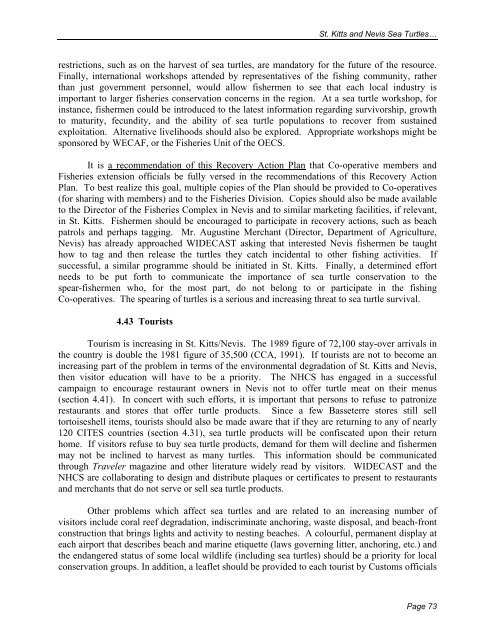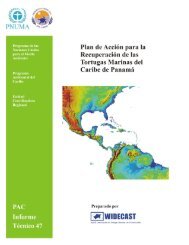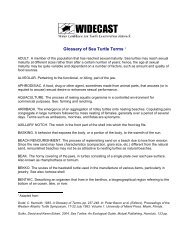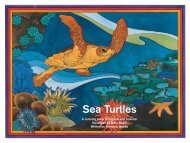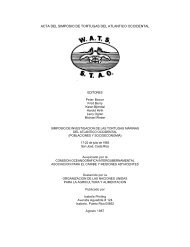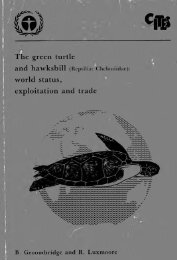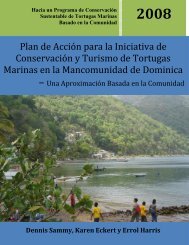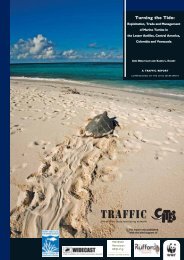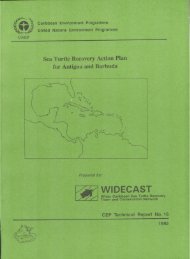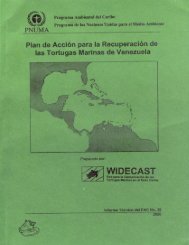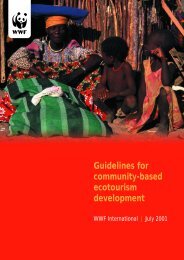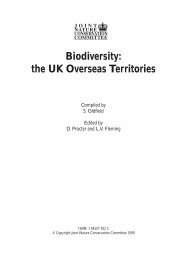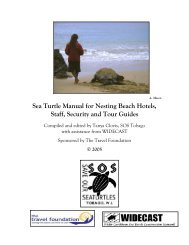Sea Turtle Recovery Action Plan for St. Kitts and Nevis - WIDECAST
Sea Turtle Recovery Action Plan for St. Kitts and Nevis - WIDECAST
Sea Turtle Recovery Action Plan for St. Kitts and Nevis - WIDECAST
Create successful ePaper yourself
Turn your PDF publications into a flip-book with our unique Google optimized e-Paper software.
<strong>St</strong>. <strong>Kitts</strong> <strong>and</strong> <strong>Nevis</strong> <strong>Sea</strong> <strong>Turtle</strong>s…<br />
restrictions, such as on the harvest of sea turtles, are m<strong>and</strong>atory <strong>for</strong> the future of the resource.<br />
Finally, international workshops attended by representatives of the fishing community, rather<br />
than just government personnel, would allow fishermen to see that each local industry is<br />
important to larger fisheries conservation concerns in the region. At a sea turtle workshop, <strong>for</strong><br />
instance, fishermen could be introduced to the latest in<strong>for</strong>mation regarding survivorship, growth<br />
to maturity, fecundity, <strong>and</strong> the ability of sea turtle populations to recover from sustained<br />
exploitation. Alternative livelihoods should also be explored. Appropriate workshops might be<br />
sponsored by WECAF, or the Fisheries Unit of the OECS.<br />
It is a recommendation of this <strong>Recovery</strong> <strong>Action</strong> <strong>Plan</strong> that Co-operative members <strong>and</strong><br />
Fisheries extension officials be fully versed in the recommendations of this <strong>Recovery</strong> <strong>Action</strong><br />
<strong>Plan</strong>. To best realize this goal, multiple copies of the <strong>Plan</strong> should be provided to Co-operatives<br />
(<strong>for</strong> sharing with members) <strong>and</strong> to the Fisheries Division. Copies should also be made available<br />
to the Director of the Fisheries Complex in <strong>Nevis</strong> <strong>and</strong> to similar marketing facilities, if relevant,<br />
in <strong>St</strong>. <strong>Kitts</strong>. Fishermen should be encouraged to participate in recovery actions, such as beach<br />
patrols <strong>and</strong> perhaps tagging. Mr. Augustine Merchant (Director, Department of Agriculture,<br />
<strong>Nevis</strong>) has already approached <strong>WIDECAST</strong> asking that interested <strong>Nevis</strong> fishermen be taught<br />
how to tag <strong>and</strong> then release the turtles they catch incidental to other fishing activities. If<br />
successful, a similar programme should be initiated in <strong>St</strong>. <strong>Kitts</strong>. Finally, a determined ef<strong>for</strong>t<br />
needs to be put <strong>for</strong>th to communicate the importance of sea turtle conservation to the<br />
spear-fishermen who, <strong>for</strong> the most part, do not belong to or participate in the fishing<br />
Co-operatives. The spearing of turtles is a serious <strong>and</strong> increasing threat to sea turtle survival.<br />
4.43 Tourists<br />
Tourism is increasing in <strong>St</strong>. <strong>Kitts</strong>/<strong>Nevis</strong>. The 1989 figure of 72,100 stay-over arrivals in<br />
the country is double the 1981 figure of 35,500 (CCA, 1991). If tourists are not to become an<br />
increasing part of the problem in terms of the environmental degradation of <strong>St</strong>. <strong>Kitts</strong> <strong>and</strong> <strong>Nevis</strong>,<br />
then visitor education will have to be a priority. The NHCS has engaged in a successful<br />
campaign to encourage restaurant owners in <strong>Nevis</strong> not to offer turtle meat on their menus<br />
(section 4.41). In concert with such ef<strong>for</strong>ts, it is important that persons to refuse to patronize<br />
restaurants <strong>and</strong> stores that offer turtle products. Since a few Basseterre stores still sell<br />
tortoiseshell items, tourists should also be made aware that if they are returning to any of nearly<br />
120 CITES countries (section 4.31), sea turtle products will be confiscated upon their return<br />
home. If visitors refuse to buy sea turtle products, dem<strong>and</strong> <strong>for</strong> them will decline <strong>and</strong> fishermen<br />
may not be inclined to harvest as many turtles. This in<strong>for</strong>mation should be communicated<br />
through Traveler magazine <strong>and</strong> other literature widely read by visitors. <strong>WIDECAST</strong> <strong>and</strong> the<br />
NHCS are collaborating to design <strong>and</strong> distribute plaques or certificates to present to restaurants<br />
<strong>and</strong> merchants that do not serve or sell sea turtle products.<br />
Other problems which affect sea turtles <strong>and</strong> are related to an increasing number of<br />
visitors include coral reef degradation, indiscriminate anchoring, waste disposal, <strong>and</strong> beach-front<br />
construction that brings lights <strong>and</strong> activity to nesting beaches. A colourful, permanent display at<br />
each airport that describes beach <strong>and</strong> marine etiquette (laws governing litter, anchoring, etc.) <strong>and</strong><br />
the endangered status of some local wildlife (including sea turtles) should be a priority <strong>for</strong> local<br />
conservation groups. In addition, a leaflet should be provided to each tourist by Customs officials<br />
Page 73


